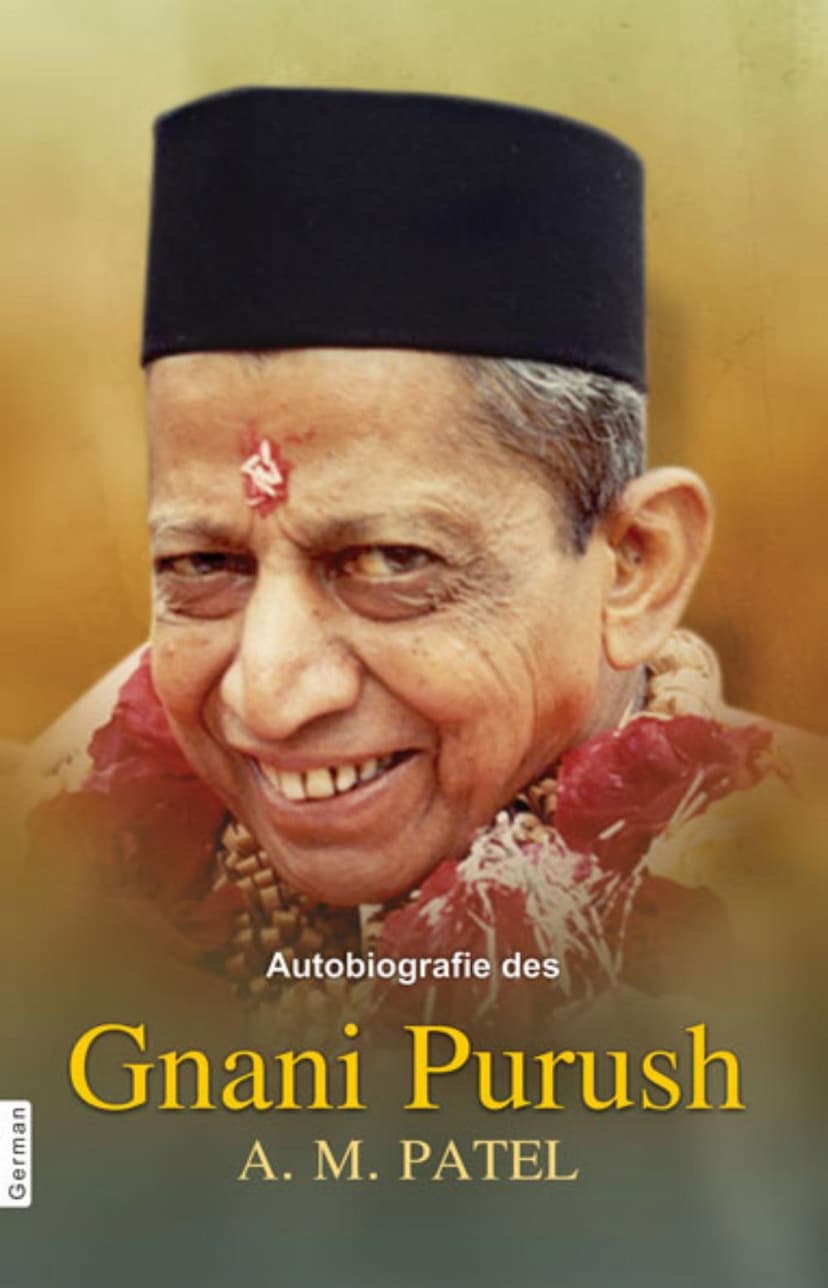Autobiograpy Of Gnani Purush A M Patel German
Added to library: September 1, 2025

Summary
Here's a comprehensive summary of the provided Jain text, "Autobiography of Gnani Purush A. M. Patel" (German edition):
This book is the autobiography of Ambalal Muljibhai Patel, who became known as Gnani Purush Dadashri, or Dada Bhagwan. The central theme revolves around his profound spiritual realization, the establishment of Akram Vignan (the stepless science of Self-realization), and the continuation of his mission through his successors.
Key Events and Concepts:
-
The Phenomenal Event of Self-Realization: The pivotal moment occurred on an evening in June 1958 at Surat railway station. In a span of 48 minutes, Ambalal Muljibhai Patel experienced a spontaneous self-realization. His ego dissolved completely, and from that moment on, he was detached from Ambalal's thoughts, words, and actions. He became an instrument of the "Lord of Liberation," whom he named 'Dada Bhagwan,' a divine presence residing within him and all living beings. This event answered all fundamental spiritual questions about the self, God, karma, and liberation.
-
Akram Vignan (The Stepless Science): Dada Bhagwan's teachings are centered around Akram Vignan, a direct and stepless path to Self-realization. Unlike the "Kramic" (step-by-step) path which involves rigorous spiritual practices and renunciations, Akram Vignan offers a shortcut, akin to an elevator ride to spiritual freedom. This science was transmitted to others through a scientifically designed process called "Gnan Vidhi," which takes about 2 hours.
-
Dada Bhagwan vs. A.M. Patel: Dada Bhagwan clarifies that he, A.M. Patel, is not God. He is a Gnani Purush (an enlightened being) in whom the Lord 'Dada Bhagwan' has fully manifested. Dada Bhagwan explains that the Lord exists within everyone but has not yet fully manifested. He emphasizes his own humility, stating he bows to the 'Dada Bhagwan' within him, acknowledging a perceived shortfall of four degrees from complete spiritual perfection.
-
Continuation of the Mission: Dada Bhagwan appointed Dr. Niruben Amin to continue his work, imparting his special spiritual powers to her. She served as his successor, spreading Akram Vignan globally with unconditional love. After her passing, Pujya Deepakbhai Desai now carries forward the lineage as the current spiritual leader, also blessed with spiritual powers and trained by Dada and Niruma.
-
The Nature of a Gnani Purush: A Gnani Purush is described as someone who has fully realized the Self and can impart this knowledge to others. They are characterized by complete detachment (Vitarag), possessing perfect knowledge and vision. Their words carry immense power and manifest at the opportune moment. They are free from ego, attachment, and aversion, and see the Pure Soul in every being.
-
Childhood and Early Life: The autobiography details A.M. Patel's early life, highlighting his innate spiritual inclination, his mother's profound influence on his values of non-violence and kindness, and his independent nature. He questions traditions, exhibits a desire for truth, and shows remarkable detachment even as a child. His early life was marked by intellectual curiosity, a strong sense of self, and an unusual approach to worldly matters.
-
Business and Worldly Life: Despite his spiritual path, A.M. Patel was a successful businessman. He ran his construction business with integrity, separating his spiritual quest from material gains. He maintained a balanced approach to business, prioritizing honesty and fair dealings, and often used business profits to facilitate spiritual pilgrimages for his followers. He skillfully managed his worldly life without it hindering his spiritual progress, believing that ignorance of the Self, not worldly life itself, is the impediment to liberation.
-
Detachment and Handling of Ego: The book describes his struggles with ego and pride, and his eventual transcendence of these. He learned to manage his interactions with others, recognizing the different "rotational speeds" of intellects and adapting his communication style. He emphasizes that ego cannot be destroyed but can be reduced and ultimately dissolved through the knowledge of the Self.
-
Marriage and Family Life: His marriage to Hiraba is depicted as a partnership of mutual understanding and adjustment. He describes his efforts to maintain harmony, resolve conflicts before they escalate, and treat his wife with respect and affection, even after they ceased to have a physical relationship. His commitment to his vows and his selfless care for Hiraba are evident.
-
The Essence of Akram Vignan: The core message is that Self-realization is attainable in the present age through Akram Vignan. This path involves encountering a living Gnani, receiving the knowledge of the Self through Gnan Vidhi, and adhering to the Five Principles (Agnas). The book stresses that the knowledge of the Self resides within a Gnani and can only be transmitted through direct interaction.
Key Principles and Practices:
- Pratikraman: The practice of self-reflection and seeking forgiveness for any wrongdoings, seen as a way to cleanse past karma and purify oneself.
- Vyavasthit: The understanding that all events are governed by the law of causality and that whatever happens is a result of past actions, leading to acceptance and inner peace.
- Detachment (Vitarag): The state of being completely unaffected by worldly pleasures and pains, desires, and aversions.
- Serving Humanity: A.M. Patel's life exemplified a commitment to the well-being of others and the world, driven by a profound sense of compassion and a desire to alleviate suffering.
In essence, the autobiography of Gnani Purush A.M. Patel reveals a life dedicated to spiritual truth, a revolutionary path to Self-realization that bypasses traditional austerities, and a profound understanding of life, karma, and the nature of the Self, all transmitted with immense compassion and clarity.